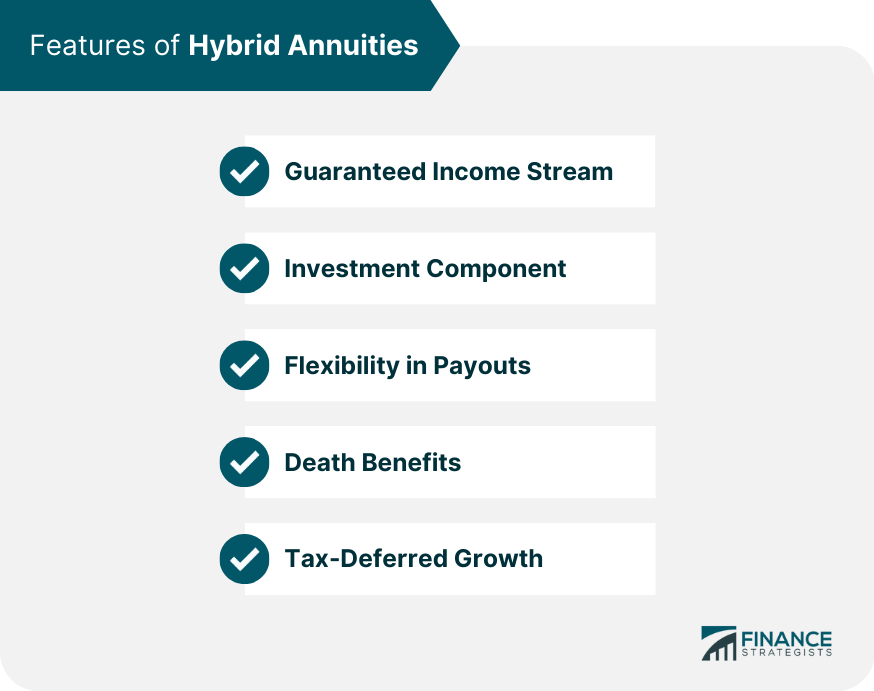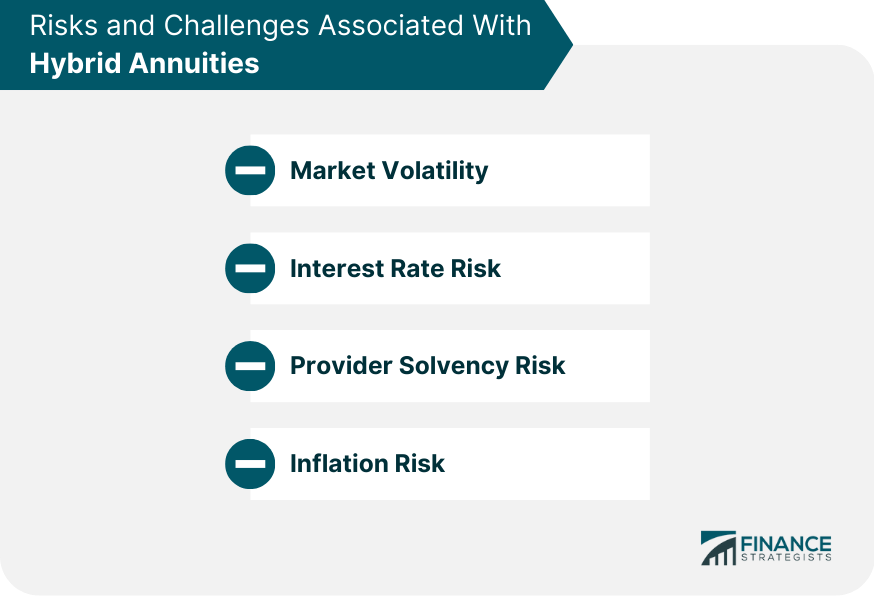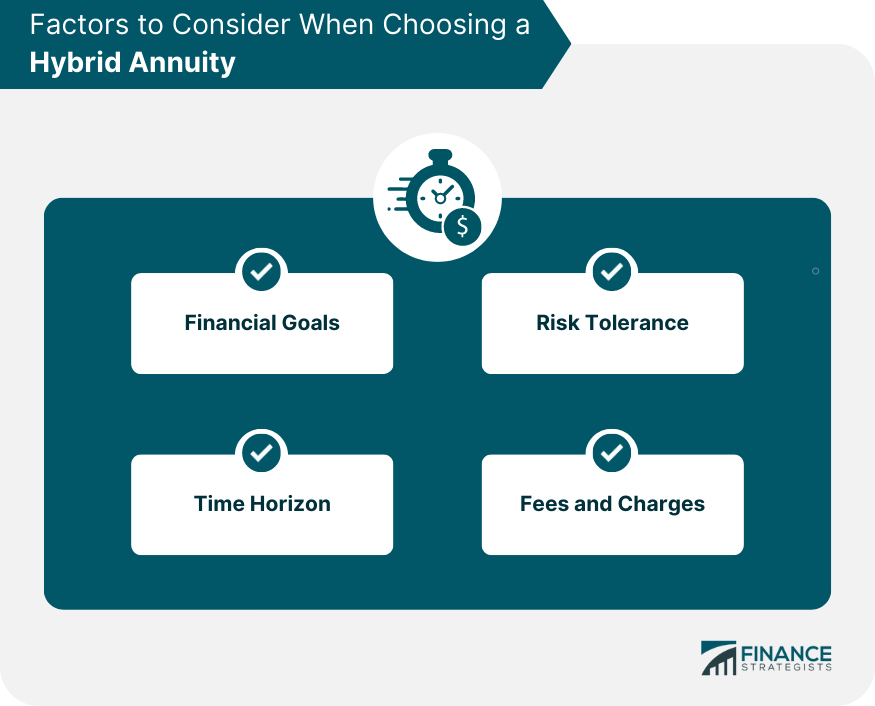A hybrid annuity is a financial product that combines the features of both fixed and variable annuities, offering investors a guaranteed income stream alongside an investment component with the potential for growth. This type of annuity aims to provide the best of both worlds, offering safety, stability, and the possibility of higher returns. Annuities come in three primary forms: fixed, variable, and hybrid. Fixed annuities provide a guaranteed income stream, while variable annuities offer a potential for growth based on the performance of underlying investments. Hybrid annuities combine elements of both fixed and variable annuities, offering both guaranteed income and investment growth potential. Hybrid annuities are designed to meet the diverse needs of investors seeking a combination of safety, guaranteed income, and potential growth. They offer a solution for those looking to balance the stability of fixed annuities with the higher returns possible with variable annuities. Insurance companies are the primary providers of hybrid annuities, offering a variety of products with different features, benefits, and fee structures. Some financial institutions, such as banks and investment firms, also offer hybrid annuity products or partner with insurance companies to provide these products to their clients. Different hybrid annuity products have varying features, such as investment options, payout structures, fees, and guarantees. Investors should carefully compare these features when selecting a hybrid annuity product. One of the main features of hybrid annuities is the guaranteed income stream they provide, similar to fixed annuities. This ensures that investors receive a stable income during their retirement years. Hybrid annuities also have an investment component, similar to variable annuities, which allows investors to participate in the growth of the financial markets. This feature provides the potential for higher returns compared to fixed annuities. Hybrid annuities offer flexibility in payout options, allowing investors to choose between various payout structures, such as lump-sum payments, periodic payments, or lifetime income streams. Many hybrid annuities offer death benefits, providing financial protection for the investor's beneficiaries in the event of the investor's death. Like other annuity products, hybrid annuities offer tax-deferred growth, allowing investors to postpone taxes on their investment gains until they start receiving income payouts. While hybrid annuities offer potential for growth, the investment component is subject to market volatility, which can impact the overall returns. Changes in interest rates can affect the guaranteed income portion of a hybrid annuity, as well as the performance of the investment component. Investors should consider the financial strength of the hybrid annuity provider, as the company's solvency can impact the guarantees and payout promises. Inflation can erode the purchasing power of the guaranteed income provided by hybrid annuities, which may not always keep pace with rising living costs. Before choosing a hybrid annuity, investors should consider their financial goals and how the annuity fits into their overall retirement plan. Investors should evaluate their risk tolerance to determine whether a hybrid annuity's investment component aligns with their investment objectives and comfort level. Considering the time horizon until retirement is essential when choosing a hybrid annuity, as it can impact the growth potential and income payouts. Understanding the fees and charges associated with hybrid annuities is crucial, as they can significantly impact the annuity's overall returns and cost. Incorporating hybrid annuities in retirement planning can help investors diversify their investment portfolio, reducing risk and potentially enhancing returns. Using hybrid annuities in retirement planning can help investors achieve a balanced asset allocation that meets their income needs and growth objectives. Hybrid annuities can play a crucial role in balancing the need for growth and income in retirement planning, providing investors with a combination of guaranteed income and potential for market participation. When compared to traditional annuities, hybrid annuities offer greater potential for growth due to the investment component, but they also come with increased risk and complexity. Dividend-paying stocks can provide income and potential for capital appreciation, but they lack the guaranteed income stream and stability of hybrid annuities. Bonds can offer stable income and lower risk than stocks, but they generally provide lower returns compared to hybrid annuities with a well-performing investment component. Real estate investments can provide income and potential for appreciation, but they lack the guarantees and stability offered by hybrid annuities. Hybrid annuities serve as a significant tool in retirement planning, offering a unique blend of guaranteed income, potential for growth, and payout flexibility. They can be a strategic addition to a diversified retirement portfolio, helping to balance the dual needs of income and growth. As these annuities combine features of both fixed and variable annuities, they provide a solution for investors seeking both safety and higher returns. However, it's crucial to remember that while they offer growth potential, the investment component is subject to market volatility, which can impact overall returns. When selecting a hybrid annuity, investors should consider their financial goals, risk tolerance, and time horizon. It's also essential to understand the fees and charges associated with the product. Comparing different hybrid annuity products and providers can help investors find the best fit for their retirement planning needs. As the annuity market continues to evolve, new products and features are likely to emerge. Staying informed about these trends and developments can help investors maximize the opportunities provided by hybrid annuities and effectively navigate their retirement planning journey.What Is a Hybrid Annuity?
Hybrid Annuity Providers and Products
Insurance Companies
Financial Institutions
Key Product Features and Differences
Features of Hybrid Annuities
Guaranteed Income Stream
Investment Component
Flexibility in Payouts
Death Benefits
Tax-Deferred Growth

Risks and Challenges Associated With Hybrid Annuities
Market Volatility
Interest Rate Risk
Provider Solvency Risk
Inflation Risk

Factors to Consider When Choosing a Hybrid Annuity
Financial Goals
Risk Tolerance
Time Horizon
Fees and Charges

Strategies for Incorporating Hybrid Annuities in Retirement Planning
Diversification
Asset Allocation
Balancing Growth and Income Needs
Comparing Hybrid Annuities With Other Retirement Income Options
Traditional Annuities
Dividend-Paying Stocks
Bonds
Real Estate Investments
Final Thoughts
Hybrid Annuity FAQs
A hybrid annuity is an insurance product that combines the features of both fixed and variable annuities. It offers a guaranteed minimum return on investment with the potential to earn higher returns depending on market performance.
A hybrid annuity works by providing the policyholder with both a fixed interest rate and the ability to invest in a variety of underlying investments, such as stocks and bonds. The fixed interest rate provides a guaranteed minimum return on investment, while the underlying investments can offer the potential for higher returns.
The benefits of a hybrid annuity include the potential for higher returns than a traditional fixed annuity, while still offering a guaranteed minimum return. Additionally, the underlying investments can be tailored to match the policyholder's risk tolerance and investment goals.
The drawbacks of a hybrid annuity include the potential for market volatility affecting the value of the underlying investments. Additionally, fees associated with the annuity can be higher than other investment options.
A hybrid annuity may be suitable for individuals who want a balance of risk and return, while still having a guaranteed minimum return on investment. It may also be suitable for those who are planning for retirement and want to ensure a stable income stream. However, it's important to consult with a financial advisor to determine if a hybrid annuity is the right option based on an individual's specific financial situation and goals.
True Tamplin is a published author, public speaker, CEO of UpDigital, and founder of Finance Strategists.
True is a Certified Educator in Personal Finance (CEPF®), author of The Handy Financial Ratios Guide, a member of the Society for Advancing Business Editing and Writing, contributes to his financial education site, Finance Strategists, and has spoken to various financial communities such as the CFA Institute, as well as university students like his Alma mater, Biola University, where he received a bachelor of science in business and data analytics.
To learn more about True, visit his personal website or view his author profiles on Amazon, Nasdaq and Forbes.















